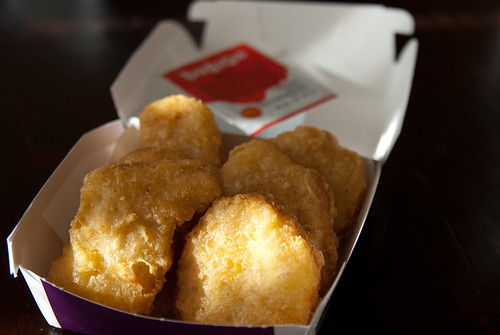Marketers know this. They know that people are susceptible to any life improvement snake oil they can hock right now. They know that they have a very narrow window in which to capitalize on these dollars. And they know that resolutions tend to fall into the same categories: lose weight/get fit, get organized, save money, eat healthier, quit smoking/drinking.
That's why if you walk into a store, there are workout DVDs on every end cap. There are shelving units in various sizes on sale. There are stop smoking aids on display. Weight Watchers sponsored Dick Clark's New Year's Rocking Eve (here's an interesting blog post about one of their commercials).
So, it is with the backdrop of "new you" marketing overdrive that I hear some radio ads on my way to work this morning. The first is for the McDonald's "Mini Meals."
A Mini Meal is a small drink, a small fry, and either a double cheeseburger, four-piece chicken nugget, or a McChicken sandwich for "under three dollars" ($2.99). The ad made it sound like this was the perfect solution when you weren't really hungry for a full meal and you needed something for a light appetite and lighter budget.
First of all, what are you putting in food that you can make a profit selling it to me for three bucks? Nothing that I want to eat.
Secondly, that McChicken Mini Meal has 590 calories, 43% of the daily recommended fat intake, and 42% of the daily recommended sodium intake. And this is supposed to be a snack?
Okay, so that commercial ends, and the next one is for some weight loss supplement. I don't remember which one it was, but it was an "all natural" tablet that you take once a day to help you reach your weight loss goals. It reminded me that there are HCG displays in the pharmacy department of Wal-Mart, products that the FDA and FTC are working to remove from the market because their deceptive advertising is fraudulent.
In the midst of this weight loss New Year's fervor, Strong4Life--a Georgia organization designed to combat childhood obesity--released a new campaign. They have print ads featuring forlorn, overweight children in black and white shots. They also have television commercials they launched earlier in the year. Here's one of the ads:
In it, young Maritza explains that she's been diagnosed with hypertension and she's "really scared." Words flash on the screen "Some diseases aren't just for adults anymore" and "Stop sugarcoating it, Georgia."
Here's another:
This campaign is the subject of some criticism. Yale psychologist Rebecca Puhl explains that "Stigma is not an effective motivator. . . if they are teased or stigmatized they're much more likely to engage in unhealthy eating and avoidance of physical activity."
While some people recognize that the ads may draw attention to the problem (Georgia ranks second in the US for childhood obesity), they don't see any solutions offered in the ads, just more shame and stigmatization.
So, on one hand we have a culture that supports 600-calorie snacks that cost mere pocket change and promote weight loss as something as simple as popping a pill or sticking some drops under your tongue. Then we get angry at parents who allow their children to become obese within this culture. Then we stick those children under the public eye and magnify the shame of being fat to the national level. We don't offer any solutions for how not to be fat and we teach viewers that these children have no value beyond their fatness. As the new Special K "What Will You Gain When You Lose" campaign makes clear, people have value after they lose weight, not before. And what better way to motivate people to change their lives than remind them of how miserable and valueless they currently are, right?
I've mentioned before that I'm not sold on the notion that we shouldn't even discuss obesity and health problems correlated with weight. I do think that poor eating habits and a sedentary lifestyle are important things to address, especially for children. But I don't think we're actually doing that, probably because campaigns that address those issues aren't readily marketable. All we're doing is pointing out the obvious: fat is unpopular, even as it becomes commonplace.
I'll be glad when January's over.
Image: spacebarpark


im just punk and rebel enuf 2 want 2 see this instead---the fat kid taking a bite out of a big double cheeseburger and giving the finger
ReplyDelete